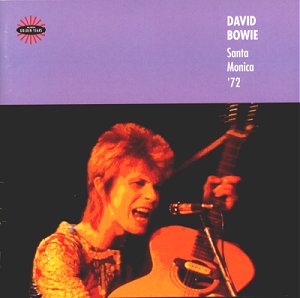δήλωσε ο ίδιος την ημέρα της κυκλοφορίας του δίσκου, 36 χρόνια μετά.
Δύο αποσπάσματα μεταδόθηκαν από τον Η.Ζάϊκο στον 958 το Σάββατο και από τότε δεν κρατιέμαι !!!
 -----------------
-----------------
 ----------------
----------------

When a bootleg album of David Bowie's Santa Monica Civic Auditorium stop on his 1972 Ziggy Stardust tour hit the market several years ago, I didn't even bother to listen to it because I couldn't imagine the music alone living up to my memory of such a spectacular visual presentation.
But Virgin / EMI finally releases an official recording from that show next Tuesday, and against all odds the album does capture the energy and excitement of what was one of the most celebrated rock 'n' roll debuts ever in Southern California. The music is so fast and furious in places in the 76-minute CD that "David Bowie: Live Santa Monica '72" is simply thrilling.
Though the English singer-songwriter already had released three albums, he didn't make a commercial smash in this country until the arrival in late 1971 of "Hunky Dory," an album with the humor, intelligence, irony and personal vision that has distinguished Bowie's best work. One song alone, "Changes," served as a personal battle cry for an artist seeking to overturn the status quo in pop.
Related
STORY: Backtracking: The Complete SeriesBowie returned a few months later with something even more captivating: "The Rise and Fall of Ziggy Stardust and the Spiders From Mars," a concept album abut a rock 'n' roll alien. In this case, Ziggy actually was supposed to be from outer space, but his plight also represented the dreams and doubts of any young person trying to figure out his or her place in the world.
When Bowie-as-Ziggy stepped on the Civic stage in the fall of 1972, he was greeted by flashing strobe lights and the strains of the Walter Carlos' kinetic version of Beethoven's "Ode to Joy," which was used in Stanley Kubrick's futuristic film "A Clockwork Orange." With his shiny metallic costume, carrot-orange tinged hair and modest layer of white makeup, Ziggy too represented a bold step into the uncertain future.
Rather than stick to the Ziggy songs in the concert, Bowie used tunes from various albums as well as Jacques Brel's "My Death" to convey a wide range of sometimes uplifting, sometimes dark themes. For the encore, he turned to "Rock 'n' Roll Suicide," a delicate, anthem-ish number from "Ziggy." Reaching out to the audience, Bowie offered these soothing words: "You're not alone . . . gimme your hands." Thousands in the auditorium reached out to him.
Περισσότερα εδώ & εδώ
Δύο αποσπάσματα μεταδόθηκαν από τον Η.Ζάϊκο στον 958 το Σάββατο και από τότε δεν κρατιέμαι !!!



When a bootleg album of David Bowie's Santa Monica Civic Auditorium stop on his 1972 Ziggy Stardust tour hit the market several years ago, I didn't even bother to listen to it because I couldn't imagine the music alone living up to my memory of such a spectacular visual presentation.
But Virgin / EMI finally releases an official recording from that show next Tuesday, and against all odds the album does capture the energy and excitement of what was one of the most celebrated rock 'n' roll debuts ever in Southern California. The music is so fast and furious in places in the 76-minute CD that "David Bowie: Live Santa Monica '72" is simply thrilling.
Though the English singer-songwriter already had released three albums, he didn't make a commercial smash in this country until the arrival in late 1971 of "Hunky Dory," an album with the humor, intelligence, irony and personal vision that has distinguished Bowie's best work. One song alone, "Changes," served as a personal battle cry for an artist seeking to overturn the status quo in pop.
Related
STORY: Backtracking: The Complete SeriesBowie returned a few months later with something even more captivating: "The Rise and Fall of Ziggy Stardust and the Spiders From Mars," a concept album abut a rock 'n' roll alien. In this case, Ziggy actually was supposed to be from outer space, but his plight also represented the dreams and doubts of any young person trying to figure out his or her place in the world.
When Bowie-as-Ziggy stepped on the Civic stage in the fall of 1972, he was greeted by flashing strobe lights and the strains of the Walter Carlos' kinetic version of Beethoven's "Ode to Joy," which was used in Stanley Kubrick's futuristic film "A Clockwork Orange." With his shiny metallic costume, carrot-orange tinged hair and modest layer of white makeup, Ziggy too represented a bold step into the uncertain future.
Rather than stick to the Ziggy songs in the concert, Bowie used tunes from various albums as well as Jacques Brel's "My Death" to convey a wide range of sometimes uplifting, sometimes dark themes. For the encore, he turned to "Rock 'n' Roll Suicide," a delicate, anthem-ish number from "Ziggy." Reaching out to the audience, Bowie offered these soothing words: "You're not alone . . . gimme your hands." Thousands in the auditorium reached out to him.
Περισσότερα εδώ & εδώ
